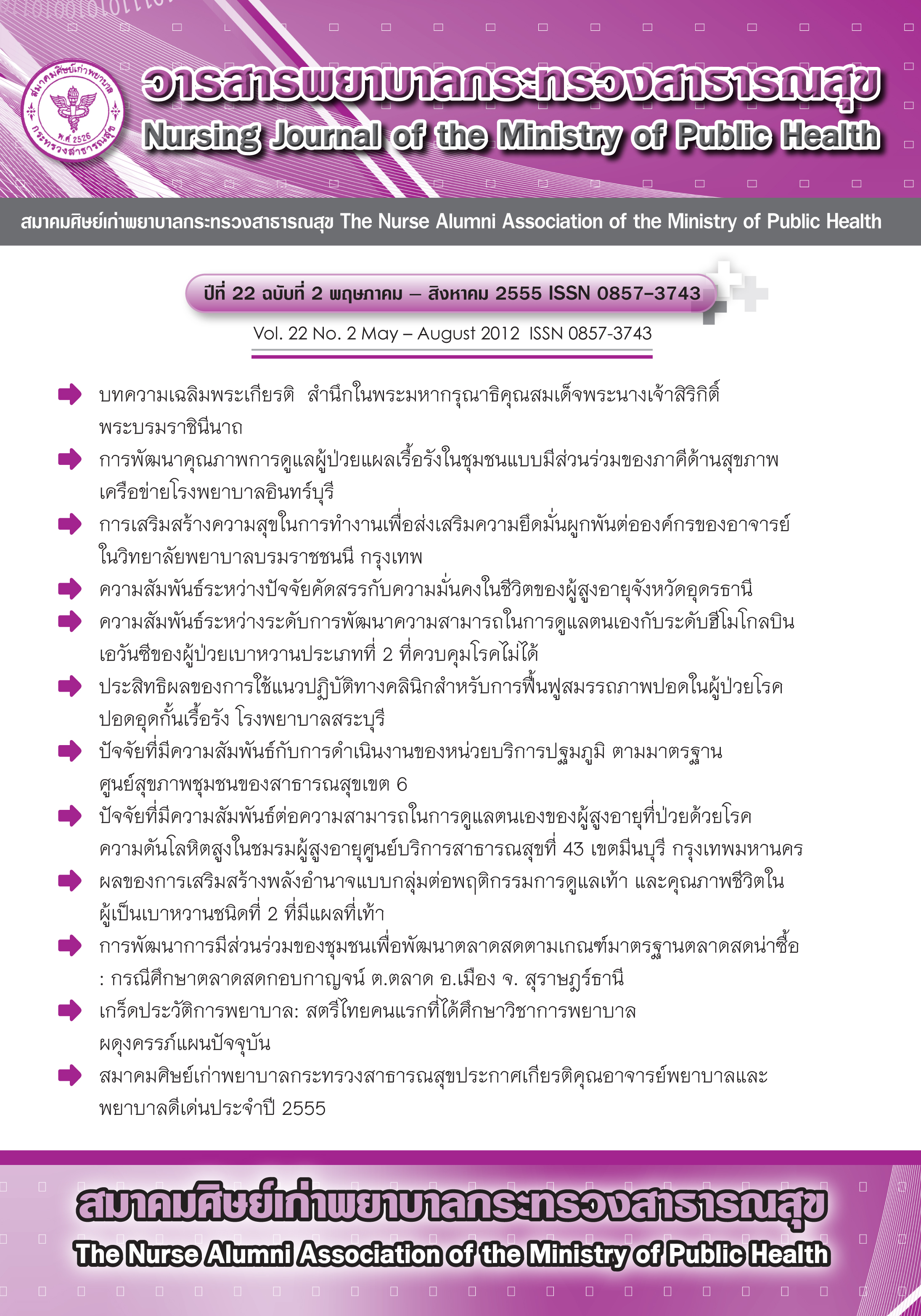ผลของการเสริมสร้างพลังอำนาจแบบกลุ่มต่อพฤติกรรมการดูแลเท้า และคุณภาพชีวิตในผู้เป็นเบาหวานชนิดที่ 2 ที่มีแผลที่เท้า
Main Article Content
Abstract
บทคัดย่อ
การศึกษาครั้งนี้เป็นการวิจัยแบบกึ่งทดลอง มีวัตถุประสงค์เพื่อศึกษาผลของการเสริมสร้างพลังอำนาจแบบกลุ่มต่อพฤติกรรมการดูแลเท้า และคุณภาพชีวิตในผู้เป็นเบาหวานชนิดที่ 2 ที่มีแผลที่เท้า กลุ่มตัวอย่างเป็นผู้ป่วยเบาหวานที่มารับการรักษาที่คลินิกเบาหวาน โรงพยาบาลบ้านโฮ่ง ตั้งแต่เดือน สิงหาคม 2554 ถึง เดือนมกราคม 2555 จำนวน 20 คน สุ่มเข้ากลุ่มตัวอย่างและกลุ่มควบคุม กลุ่มละ 10 คน กลุ่มตัวอย่างได้รับโปรแกรมการเสริมสร้างพลังอำนาจแบบกลุ่มในผู้เป็นเบาหวานชนิดที่ 2 ที่มีแผลที่เท้า ส่วนกลุ่มควบคุมได้รับการดูแลตามแนวทางปกติที่เคยปฏิบัติ ใช้เวลาทดลอง 24 สัปดาห์ เครื่องมือที่ใช้ในการวิจัยคือ โปรแกรมการเสริมสร้างพลังอำนาจแบบกลุ่มในผู้เป็นเบาหวานชนิดที่ 2 ที่มีแผลที่เท้า และแบบประเมินการรับรู้พลังอำนาจของผู้ป่วยเบาหวาน ซึ่งทีมผู้วิจัยสร้างขึ้นจากแนวคิดของกิ๊บสัน แบบสอบถามพฤติกรรมการดูแลเท้าของผู้เป็นเบาหวาน และแบบวัดดรรชนีคุณภาพชีวิตใช้เฉพาะโรคสำหรับผู้ป่วยเบาหวาน Diabetes-39 (D-39) ฉบับภาษาไทยผลการวิจัยพบว่าคะแนนเฉลี่ยพฤติกรรมการดูแลเท้าและคุณภาพชีวิต ระหว่างกลุ่มตัวอย่างและกลุ่มควบคุมหลังจากได้รับโปรแกรม แตกต่างอย่างมีนัยสำคัญทางสถิติที่ระดับ 0.50 โดยคะแนนเฉลี่ยพฤติกรรมการดูแลเท้าของกลุ่มตัวอย่างสูงกว่ากลุ่มควบคุม อย่างมีนัยสำคัญทางสถิติที่ระดับ .05 และคะแนนเฉลี่ยคุณภาพชีวิตของกลุ่มตัวอย่างสูงกว่ากลุ่มควบคุม อย่างมีนัยสำคัญทางสถิติที่ระดับ .05 อย่างไรก็ตาม การเสริมสร้างพลังอำนาจแบบกลุ่มต่อพฤติกรรมการดูแลเท้า และคุณภาพชีวิตในผู้เป็นเบาหวานชนิดที่ 2 ที่มีแผลที่เท้าจะต้องมีการติดตามและประเมินอย่างต่อเนื่องต่อไป
คำสำคัญ : การเสริมสร้างพลังอำนาจ, พฤติกรรมการดูแลเท้า, คุณภาพชีวิต, ผู้เป็นเบาหวานชนิดที่ 2, แผลที่เท้า
Abstract
This quasi-experimental research aimed to examine the effect of Group Empowerment on foot care behaviors and quality of life in type 2 Diabetes Patients with foot ulcers. The sample comprised 20 DM patients with foot ulcers receiving care from Ban Hong Hospital, Lamphun Province, from August 2011 to January 2012. Twenty patients were randomly assigned to experimental and control groups (10 patients per group). The experimental group received the Empowerment Program for 24 weeks whereas the control group received routine care at the hospital. Data were collected using 2 sets of questionnaires including 1) The foot care behavior questionnaire, and 2) the quality of life instrument: Thai version of the Diabetic-39. After 24 weeks, the results revealed that the average scores of foot care behaviors and quality of life among the experimental and the control groups after receiving program were statistically different (p<.05). The average score of foot care behaviors of the experimental group was higher than that of the control group, after receiving program was statistically different (p<.05). The average score on the quality of life scores of the experimental group was statistically higher (P<.05) than that of the control group after receiving program. In conclusion , the group Empowerment on Foot Care Behaviors and Quality of Life in type 2 diabetes patients with foot ulcer should have ongoing monitoring and evaluation.
Keyword: Empowerment, Foot Care Behaviors, Quality of Life, Diabetes Patients Type 2, Foot Ulcer
Article Details
บทความและรายงานวิจัยในวารสารพยาบาลกระทรวงสาธารณสุข เป็นความคิดเห็นของ ผู้เขียน มิใช่ของคณะผู้จัดทำ และมิใช่ความรับผิดชอบของสมาคมศิษย์เก่าพยาบาลกระทรวงสาธารณสุข ซึ่งสามารถนำไปอ้างอิงได้

